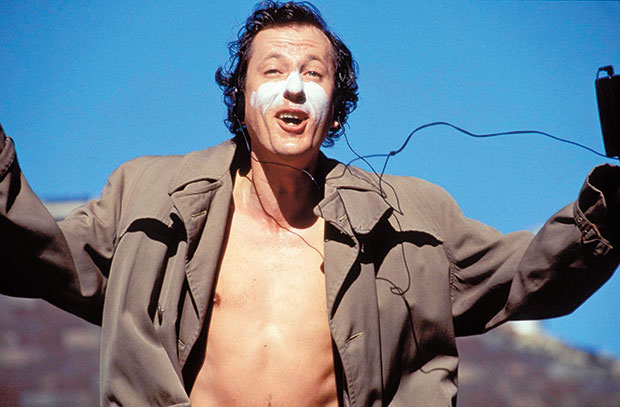I have a fairly acute memory of my childhood. And there was a big change around the age of 15. I had been learning the piano since I was eight. My mum was a single mum, a working mum, very resourceful, and she wanted my sister and I to learn the piano. But around age 15 I fell out with the piano teacher and around the same time I entered the school drama club. To me, it was an oasis of creativity and freedom. I wasn’t sporty, and I wasn’t keen on the very regimented approach of my teachers, mostly men from the World War Two period, with short-back-and-sides cuts. My hair was past my collar. When I joined the drama group, I immediately knew they were my people.
At first in the theatre group we had art, music and drama teachers, who blessed me with their mentorship. But they all got moved on so we decided to run the club ourselves. We did hoary old plays like The Admirable Crichton or Arsenic and Old Lace. But though I was completely obsessive about being involved in the theatre and being in a rock band, I didn’t even entertain the idea of making a career out of it. I felt surrounded by creative activity but there was nowhere to put it. I thought I might end up a radio announcer or a teacher.

Sometime I look at old box brownie photographs of that time and I see this pimply, skinny kid who looks quite gawky. I don’t know if I could give him advice – it’s more the reverse, he still has an impact on me. Actually, we have pretty regular conversations. He taught me how to deal with a life of constant shifts and lots of eclectic influences. He moved schools a lot. He had a mum, two devoted grandmothers, an absent father… Then when he was 15 he met his stepfather, a shearer who knew about Beyond the Fringe and Samuel Beckett, a real old-school rural leftie who listened to late-night radio. I still feel a very strong, sharp connection with that teenager. He keeps reminding me to accept new stuff, always stay on your toes. So I would say thanks gawky teenager, for teaching me things that are still guiding my life in my 60s.
I remember my year 12 report. Until year 10 I was very academically sharp, top of the class. I was foolishly thinking I wanted to be an astronomer – my other great passion – so, under the wrong kind of teachers’ influence, was studying advanced maths and physics. My school report on year 12 was full of low marks for effort and industry and I told the headmaster that I disagreed with them. I said he simply didn’t know what I was doing with the theatre group. He threw me out of his office. I shouted out over my shoulder that I’d had a marvellous time at that school and now he’d spoiled it. I just felt there was an ignorance about how kids thrive.
I love musical theatre, I’m a straight show queen.
One of the most startling things in my life happened right at the end of my university years. The years 1969 to ’71 were a very vibrant time on Queensland state campus. We had a very right-wing state premier so there were a lot of demonstrations. University was full of thespians and Trotskyites. At the end of my time I got spotted by the director of the Queensland Theatre Company and offered a three-year contract. That’s still a very strong memory, when I was picked out. It turned my life around. I did my final exam on the Friday, then had my first theatre rehearsal on the Monday. In 1972 I put ‘actor’ on my first tax form. And I thought: this is good, I’m going to try to keep this up.
I’d tell my younger self it doesn’t have to happen when you’re 21 or 30. I worked with the Queensland company, then I went to Europe – including, of course, the theatre mecca that was London. I worked happily in theatre for about 24 years. Then my daughter was born and I thought, I’m on a state-subsidised theatre wage. That’s not generous. I have to start earning some money. I did about five auditions for Miss Saigon – I love musical theatre, I’m a straight show queen. I got down to a shortlist of two. Then suddenly I got the letter to say the film of Shine was going ahead. That was just my second feature film and I was 43.










